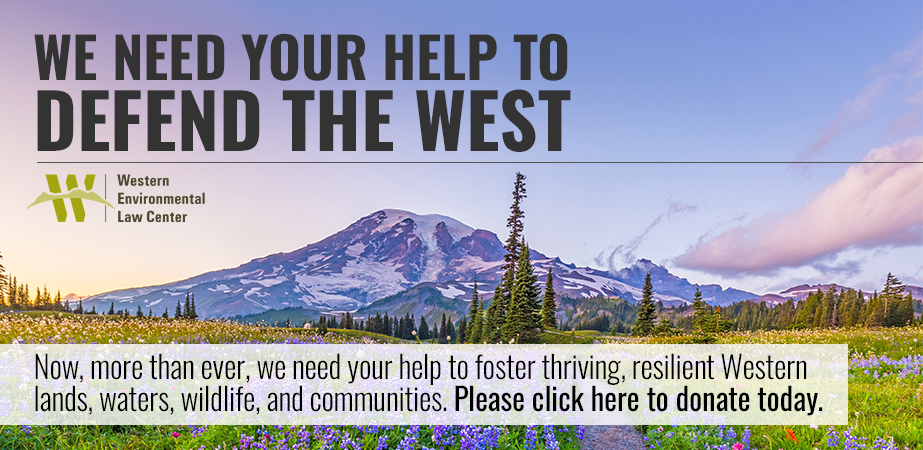Today, a U.S. District Court judge ruled against the Trump administration, reversing the U.S. Fish and Wildlife Service’s 2017 decision to strip grizzly bears in the Greater Yellowstone Ecosystem of vital Endangered Species Act protections. The court ruled that the delisting was premature, did not rely on the best available science, and improperly failed to analyze the impact killing grizzlies just outside the safety of Yellowstone and Grand Teton National Parks would have on other imperiled populations in the lower 48 states.
“The importance of today’s ruling cannot be overstated: the very bears essential to achieve connectivity between still-struggling isolated grizzly populations would have died at the hands of trophy hunters. Now, not only do the Yellowstone region’s bears have a fighting chance, so too do grizzlies across the lower 48,” said Bethany Cotton, wildlife program director for WildEarth Guardians. “We are gratified the court saw the numerous flaws in the Service’s decision, and stepped in to stop a cascade of events that would have put this already struggling icon of the West closer to extinction.”
The Service illegally carved out the Yellowstone population without adequately considering the impact of removing the bear’s protections on the survival of other imperiled populations of grizzly bears. The recovery of those populations depends heavily on inter-population connectivity and genetic exchange. Under the Trump administration’s plan, dispersing grizzlies essential to species recovery would have to pass through a killing zone outside of Yellowstone and Grand Teton National Parks where Wyoming and Idaho rushed to approve trophy hunts.
“So many people poured their hearts and souls into saving these grizzly bears and in the end justice prevailed,” said Matthew Bishop, an attorney with the Western Environmental Law Center. “Politics has no place in removing species from protective status – decisions must be driven by the best available science and here, the science says grizzly bears remain threatened in the lower 48 and in the Yellowstone region. Today’s decision is a firm reminder to the Fish and Wildlife Service of its duty.”
Grizzlies in the Yellowstone region remain threatened by dwindling food sources, climate change, small population size, isolation, habitat loss and fragmentation, and high levels of human-caused mortality. The Yellowstone population is isolated and has yet to connect to bears elsewhere in the U.S., including to bears in and around Glacier National Park. Grizzlies also have yet to reclaim key historic habitats, including the Bitterroot Range along the Montana-Idaho border.
Hunted, trapped, and poisoned to near extinction, grizzly bear populations in the contiguous U.S. declined drastically from nearly 50,000 bears to only a few hundred by the 1930s. In response to the decline, the Service designated the species as threatened under the Endangered Species Act in 1975, a move that likely saved them from extinction. The species has since struggled to hang on, with only roughly 1,800 currently surviving in the lower 48 states. Grizzlies remain absent from nearly 98 percent of their historic range. Last year (2017) marked the highest mortality for the Greater Yellowstone Ecosystem’s grizzlies since their ESA listing.
Grizzly bear mortality in 2018 is proceeding at a record pace, even without the added mortalities from trophy hunting which would have claimed up to 22 more. At last count, approximately 690 grizzly bears resided in the Greater Yellowstone region, down from 2015’s count of 717 bears. The last three years had near record-breaking grizzly mortality, with at least 41 bears killed in 2017, and an additional 15 listed as probable mortalities. Of this, at least 32 were killed by humans, and humans were responsible for at least 9 of the 15 probable deaths. As of this writing, 42 grizzlies are on the 2018 known and probable mortalities list for the Greater Yellowstone ecosystem, far outpacing previous years’ rates.
A copy of the ruling is available here.
Contacts:
Matthew Bishop, Western Environmental Law Center, 406-324-8011, gro.w1751420004alnre1751420004tsew@1751420004pohsi1751420004b1751420004
Bethany Cotton, WildEarth Guardians, 406-414-7227, gro.s1751420004naidr1751420004aught1751420004raedl1751420004iw@no1751420004ttocb1751420004

